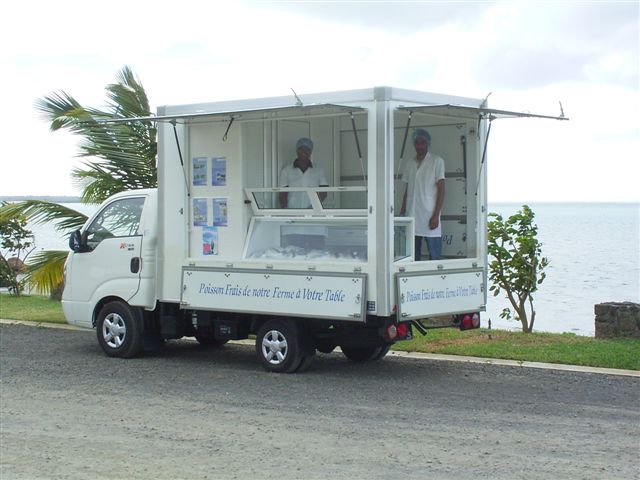
Recently I saw that the progress in quality of Fresh Fish sales. Stationed in different locations at different times fresh fish is sold in different locations of the island by a roaming truck. What a difference from the ‘Banian’, fish monger who travels on his motorcycle carting his lot of fish in his doubtfully clean basket at ambient hot temperature!
I gathered from my wife that over the radio there was again some talk on fish farming. Whilst it may be true that 6 kgs of wild fish are required to breed 1 kg of farmed fish the question to be asked is: are the 6kgs of wild fish used to make the feed consumable in form and taste to the population? On the other hand it is rumored that the feed used contain elements that are unsafe from health, some even mentioned pork meat? As far Ferme Marine de Mahebourg is concerned, after inquiry, I was assured that the feed used are to the standard of the EEC which stipulates that the farm uses feed that are natural , non toxic and animal free.
According to the FAO the share of farm fish in the world consumption is increasing. However it is necessary to regulate Fish Farming to norms that are eco friendly and to adopt practices that are development sustainable. As such, I am sure that the government who’s role is to be the watchdog has to ensure that operator’s abide to rules that are set.
Surprisingly enough, you must have heard or even seen TV documentary on the infamous breeding of Pengasius in Vietnam and in the Mekong area, and yet the European Community is still authorising the import of the fish in its territories. Is it a case of a few infamous producers that are creating adverse publicity to the healthy industry?
Mauritius is a relatively large Ocean country and its future may well be exploiting its sea potential of which Marine Fish Farming is one of them.
Is there an opportunity for Mauritius to join in the growing food sector in the world? Can Mauritius join in by producing premium quality respecting all the exigencies of the health and environmental requirements?
This is a recent an extract on the subject.
Aquaculture industry is stagnating
Published:Â 12 September, 2008
Europe’s once lucrative aquaculture industry is stagnating, beset with red tape, over-regulation and zealous planning authorities.
This was the stark warning given to an international conference today by Scottish Conservative Euro MP Struan Stevenson. Speaking at the conference ‘A Coherent Approach to Sustainable Development’, sponsored by the Spanish Government and supported by the French Presidency, in Brussels.
Struan Stevenson said:’ Europe used to lead the world in the production of farmed fish and Scotland was at the forefront of the industry, but in recent years we’ve taken our eye off the ball. We have allowed our non-EU competitors to assume dominance in this rapidly developing sector and we have seen our indigenous industry haemorrhage jobs to countries outside the EU. At a time of soaring food prices and rising consumer demand, we import almost 50 per cent of our seafood needs when we are perfectly capable of producing this food ourselves.
‘Marine aquaculture is the fastest growing food sector in the world, growing at 9 per cent per annum everywhere except in the EU, where growth is stagnating. In Europe we have the perfect environment for fish farming. We have an almost limitless coastline with ideal bays, fjords and sea conditions. We lead the world in the science and technology necessary for a thriving aquaculture sector. And yet we are in danger of starving in a land of plenty.
‘Why is this? It is because aquaculture has become one of the most heavily regulated sectors in the entire food production industry in Europe. EU aquaculture has the opportunity to double in size in the next 25 years, but only if we can tackle the unnecessary regulatory burden the sector has to contend with. EU fish-farmers have to deal with more than 400 different pieces of regulation, not to mention additional planning and environmental constraints in the Member States, before they can reel in a single fish. And this is not simply from DG Mare in the European Commission. It is from DG Environment, DG Trade, DG Sanco and a host of other agencies.
‘Red tape and the seemingly endless production of legislative directives in Europe are a gift to our competitors in China, Japan, Chile, Vietnam and elsewhere. At a time when demand for healthy fish products is rising internationally, while marine fish stocks continue to decline, the opportunities for EU aquaculture to lead the world in fish farming innovation and technological development are being hampered by red tape.
‘Above all, there is a great need for financial support for SMEs and a need to look at a simplification of the legislation affecting fish farming with an objective of better implementation at Member State level. Less red tape, less bureaucracy and a one-stop-shop approach to the development of new fish farms is an essential pre-requisite for a successful industry. We also need more flexibility in licensing of therapeutic agents and in the planning and sitting of new fish farms.’
